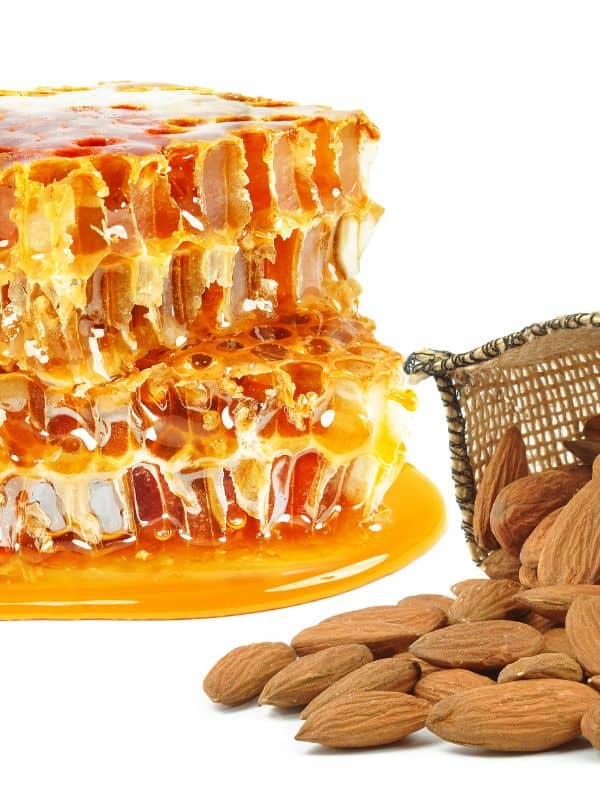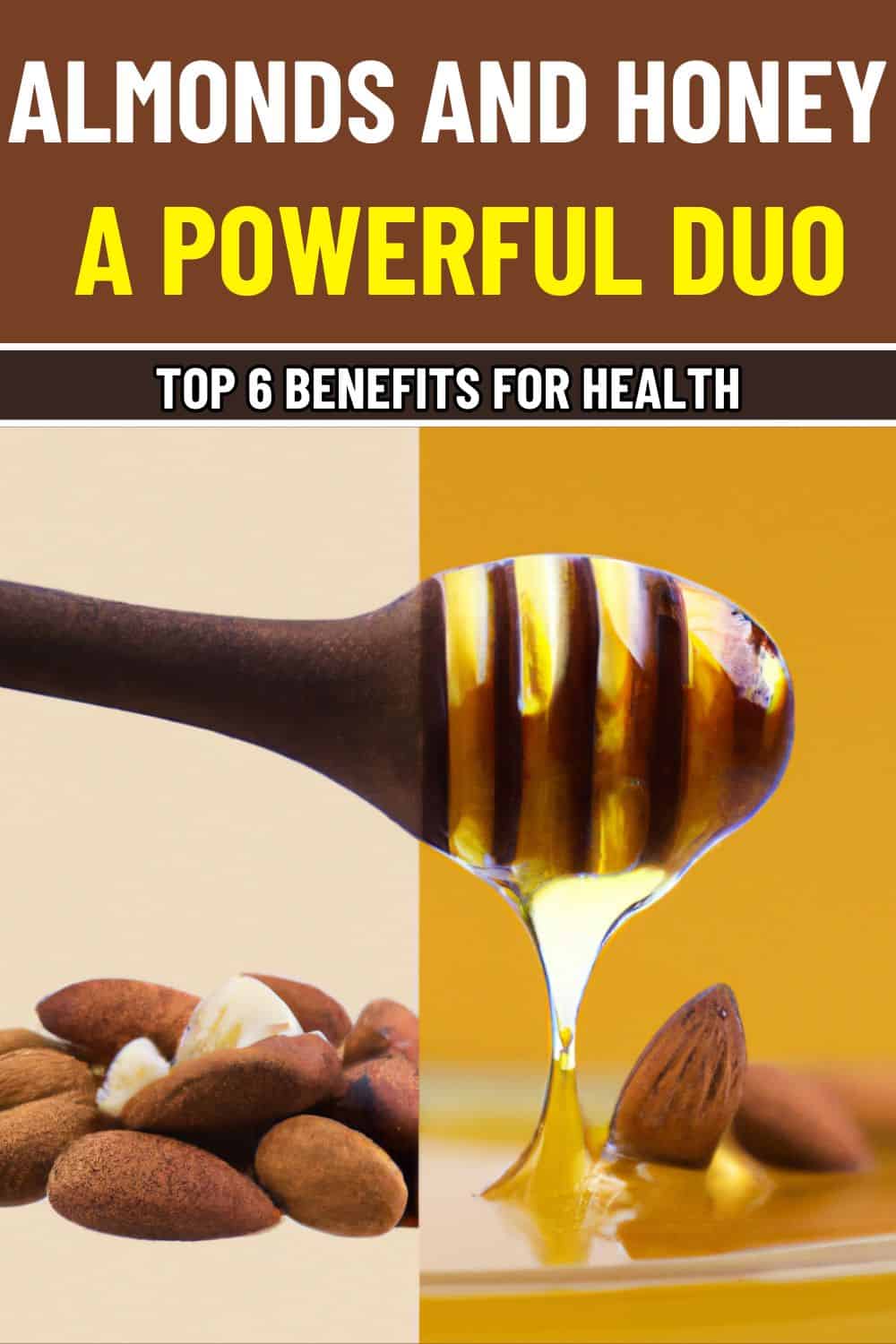Almonds and honey are two incredibly nutritious ingredients. Individually, they’re packed with benefits, but when combined, they create a powerhouse for your health.
From promoting heart health to boosting your energy levels, this mix is not only delicious but also a simple, natural way to support your well-being.
#1. Support Your Heart Health
Almonds are an excellent source of monounsaturated fats, which are known to help lower bad cholesterol (LDL) levels and increase good cholesterol (HDL).
Meanwhile, honey brings its benefits to the table it’s rich in antioxidants, which help reduce oxidative stress and inflammation in your blood vessels.
In fact, research published by the American Heart Association has found that the healthy fats in almonds can improve your cholesterol profile and overall heart function.
So, with 14 grams of healthy fats in every ounce of almonds, you can see why this combo is a heart-friendly powerhouse.

#2. Aids in Weight Management and Curbs Cravings
Almonds are high in fiber and protein, both of which help you feel full longer, reducing overall calorie intake.
Meanwhile, honey can satisfy your sweet cravings without the guilt, as it provides a natural energy boost while keeping blood sugar levels stable.
Moreover, honey, with its low glycemic index, offers a healthier way to curb sugar cravings.

#3. Promote Healthy Skin and Slow Down Aging
Almonds and honey are often used in skin care products due to their rejuvenating and moisturizing properties.
A 1-ounce serving of almonds gives you about 7.3 mg of vitamin E, which protects skin cells from damage and promotes skin regeneration. Honey, a natural humectant, attracts moisture to the skin, keeping it hydrated.
You can easily apply a homemade mask with honey and crushed almonds for glowing, soft skin.
In fact, research published in the Journal of Dermatological Treatment highlights the skin benefits of almond oil, including its ability to reduce inflammation and improve complexion.

#4. Boost Your Digestive Health
Almonds are high in fiber, which supports healthy digestion by regulating bowel movements and preventing constipation.
Honey acts as a prebiotic, feeding the good bacteria in your gut and promoting better digestion.
Studies published in the Journal of Nutritional Biochemistry indicate that honey’s prebiotic effects are crucial in enhancing gut health.
The 3.5 grams of fiber per ounce of almonds combined with the digestive benefits of honey can help you maintain a happy, healthy gut.

#5. Fuel Your Energy Levels
The natural sugars in honey provide a quick energy boost without the crash that comes from refined sugars.
Almonds, on the other hand, are a great source of complex carbohydrates and healthy fats that release energy slowly, keeping you energized throughout the day.
Together, this combination offers a sustained, balanced energy source. According to research from The Journal of Nutrition, almonds provide lasting energy without causing blood sugar spikes.

#6. Boost Immunity Naturally
Honey is a well-known natural antimicrobial agent. It can help fight bacteria and viruses, while almonds contribute by providing essential nutrients like Vitamin E, which boosts immune function.
Together, they provide a one-two punch to keep your immune system strong, especially during colder months.
Almonds are rich in Vitamin E, which has antioxidant properties, while honey is known for its antimicrobial activity.

How to Use Almonds and Honey in Your Daily Routine
1. Almonds and Honey Oatmeal
How to Make:
Start by cooking ½ cup of rolled oats in water or milk (about 1 cup) until soft. Once cooked, remove from heat and stir in 1 tablespoon of honey and a handful of chopped almonds (about 10-12).
For extra flavor, you can add a pinch of cinnamon or a few slices of banana on top.
How to Use:
Enjoy this oatmeal as a nutritious breakfast or a filling snack. You can prepare it the night before and store it in the fridge for an easy, on-the-go option.
Benefits of This Dish:
The combination of honey and almonds provides a good dose of healthy fats, fiber, and antioxidants. Almonds are rich in heart-healthy monounsaturated fats, while honey has anti-inflammatory properties that help reduce the risk of heart disease.
This dish provides a balanced mix of complex carbs from oats, healthy fats from almonds, and natural sugars from honey, giving you a steady release of energy throughout the morning.
2. Almond and Honey Smoothie
How to Make:
In a blender, combine 1 tablespoon of honey, ½ cup of almonds (soaked overnight if you prefer), 1 banana, and 1 cup of unsweetened almond milk (or any milk of your choice).
Blend until smooth and creamy. Add a few ice cubes for a chilled version or a handful of spinach for added nutrients.
How to Use:
This smoothie makes for a great breakfast option or an afternoon pick-me-up. You can customize it with other fruits or even a spoonful of chia seeds for extra fiber.
Benefits of This Dish:
The almond milk and honey both have moisturizing properties that may promote healthier skin. Plus, the smoothie contains vitamin B and antioxidants, which support a radiant complexion.
3. Honey and Almond Yogurt Parfait
How to Make:
In a bowl or glass, layer ½ cup of Greek yogurt with 1 tablespoon of honey, ¼ cup of chopped almonds, and fresh fruit like berries or sliced banana.
Repeat the layers and drizzle a bit more honey on top. For extra texture, you can add a sprinkle of granola or chia seeds.
How to Use:
Enjoy this parfait as a satisfying breakfast or a healthy dessert. It’s an easy, customizable dish that can be made ahead of time and kept in the fridge for a quick snack.
Benefits of This Dish:
Greek yogurt is rich in probiotics, which support digestive health. Combined with the fiber and healthy fats in almonds, this parfait is an excellent way to support your gut.
Also, honey contains antibacterial and anti-inflammatory properties, while the almonds’ vitamin E can strengthen the immune system and fight oxidative stress.

Cautions and Precautions
Almonds, while healthy, are calorie-dense, so eating too many could lead to weight gain.
Honey, though natural, is still a form of sugar, so it should be used sparingly, especially if you have blood sugar issues or are diabetic.
Additionally, honey should not be given to children under 1 year of age due to the risk of botulism. If you have allergies to nuts or bee products, you should avoid almonds and honey altogether.
Disclaimer
This article is for informational purposes only and should not be considered medical advice.
Always consult with a healthcare provider before making any significant changes to your diet, especially if you have specific health conditions.







